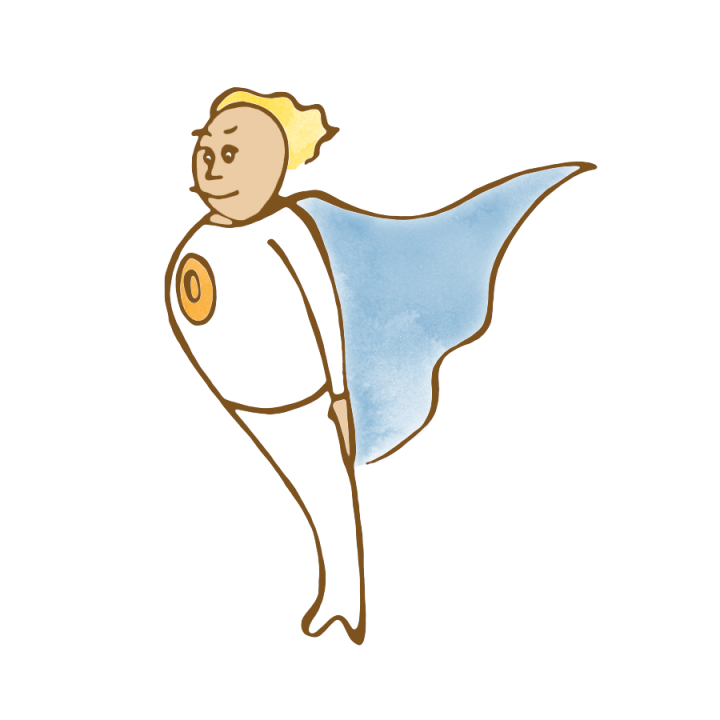How to Be Super: Step One — Keep Your Eyes Open
The first of the Prime Power Protocols is at once vigilant like a private eye and passive like a feather bed. One must remain both strong and soft to be open to the world and let the world speak to you. Here is the vigilance. No daydreaming about a new pair of boots or worrying about your work. The mental list of errands or the practice of replaying a conversation will distract you. Messages and signs come in all moments — including those in which you are not paying attention.
“Your eyes” are not limited to only your eyes, but includes all your senses: hearing, smell, taste, and touch in addition to seeing. You may see something, to be sure, but messages often come shouted across the street or from a passing car radio. Messages can come wafting by with the smell of perfume or a vanilla candle. You might taste almond in a cookie that will remind you of your best friend from second grade whose mom made delicious marzipan. You might feel something uncomfortable in your pocket and think it is a stone when in fact it is a plastic ring given to you by a little girl. All these things are potential messages or signs – but they must be seen or heard or smelled or tasted to be of any use.
“Open” in the phrase “Keep your eyes open” points to the way this protocol is soft like a feather bed. To be open is to be receptive and available. Your awareness is not focused on something in particular. Your gaze is wide and fuzzy – taking in all images, colors, and words without judgment. To be open is to hear the music, conversations, street noise, and bird-calls all at once like an orchestra. Openness welcomes all smells (including those that are yucky), all tastes (including those that disgust), all touches (including those that are painful). All that surrounds you is welcome in that moment.
Now you are ready to begin. You are present and poised to notice something – something important. Perhaps even something impossible.
You are ready. You are excited. You are feeling at once excited and maybe a little nervous. Thus begins the opening of a door – a door that stays open from this point forward.
So then – first, sit on a bench.
This Protocol asks that you have a point from which you can watch, listen, smell, feel, and even taste freely. Park or street benches are excellent options for this protocol. Chairs in coffee shops or restaurants are certainly acceptable, but benches are best. They are clearly public, open to whoever wishes to use them. They require no purchase or rental. They are anchored patiently on street corners or next to statues, waiting for no one in particular. To sit on a bench is to be an integral part of the environment, to be enmeshed in all that is around you. In cold climates, libraries or malls offer indoor public options. In all cases, the bench or chair is best when there is no feeling of being rushed or tension around a time limit. Airports can be excellent locations so long as the departure time is not a distraction. Being relaxed and unselfconscious is key to being open and available. At first, it is best to be alone. This will free you of any tension over conversing or focusing your attention on a single location. With practice, you will be able to “keep your eyes open” while chatting or engaging with others.
Now – the next thing you will need is an occupier – something to busy yourself with.
It is helpful and sometimes necessary to have a clear “reason” for sitting on the bench. This can be sipping a cup of coffee or eating a bagel. You could seem to be listening to music or reading the paper. The point of the occupier is to give you license for looking around. If you have a cup of tea in your hand, someone might not suspect that you are watching them. If you are reading a novel, someone may feel freer to chat openly with his friend. An occupier will also give you permission to relax. You can confidently display your sandwich as an announcement to everyone that you are eating your lunch – and not necessarily engaging in a superpower protocol. It is very important, however, that your occupier not distract you. Eat, drink, read the paper – but do so with most of your attention around you. The taste of the jalapenos in your taco may be just the message you were seeking – but don’t let the taco keep you from noticing the pink socks on the police officer walking by.
Okay – now let yourself soften.
Once you have your park bench and your cup of tea or slice of pizza, you can begin to “keep your eyes open.” This is a softening process where you let the world around you be as it is without making any judgments about how you think it should be. This can start as a physical relaxation exercise where you feel your legs, arms, neck, and chest and let them relax and feel soft. Forcing it generally doesn’t work. It is more effective to note where there is hardness – stress or tightness – and move on. You can say to yourself “my elbow hurts” or “there is a buzzing in my ear” and then leave it alone. Thinking about things and judging them often hinders the softening process. Best to note and then let go. Note and then let go. Letting go is an effective and efficient way to soften.
Okay – now widen your gaze.
Now that you are soft, you can take in your environment with ease and openness. In a single moment you can see the poodle dog’s collar and the Illinois license plate. You can hear the airplane as well as the little boy’s excuse for losing his thirty cents. You can smell burning leaves and fresh bread. You can taste your peppermint tea and the salt in the air. You can feel the park bench under your body, the snowflake on your forehead, and the squirrel brush past your ankle. All are welcome and swirl around you like a giant bubble bath.
And then, something grabs you.
Now, for no apparent reason, one sight, sound, sensation, or word demands your full attention. Something will happen that is out of the ordinary and carries a quality of magic. Something may even seem impossible. You will see the child holding a small bag and a little furry head will suddenly peek out. A man who is talking to his wife might casually place his finger in his ear and then another man across the street might make the same gesture and look at you. It may look like an old woman’s face transforms into that of a young man. A laughing teenager might seem to pick a car up off the ground – only for a moment – and then walk away with his buddies. Curious things will likely happen, improbable things often happen, and impossible things will eventually happen. If your eyes are open, you will surely see them.
Nice work – you are well on your way. You have seen something. You paid attention and you saw something. Next is one of the most important and most difficult steps: Believe it.
You can listen to the story "I Am Marvel (How I Became Super)" on the streaming website, or purchase the series in our store.
About the Author

David Sewell McCann
David Sewell McCann fell in love with spinning stories in first grade – the day a storyteller came to his class and captured his mind and imagination. He has been engaged in storytelling all of his adult life through painting, film-making, teaching and performing. Out of his experience as a Waldorf elementary class teacher and parent, he has developed a four step method of intuitive storytelling, which he now shares through workshops and through this website.

